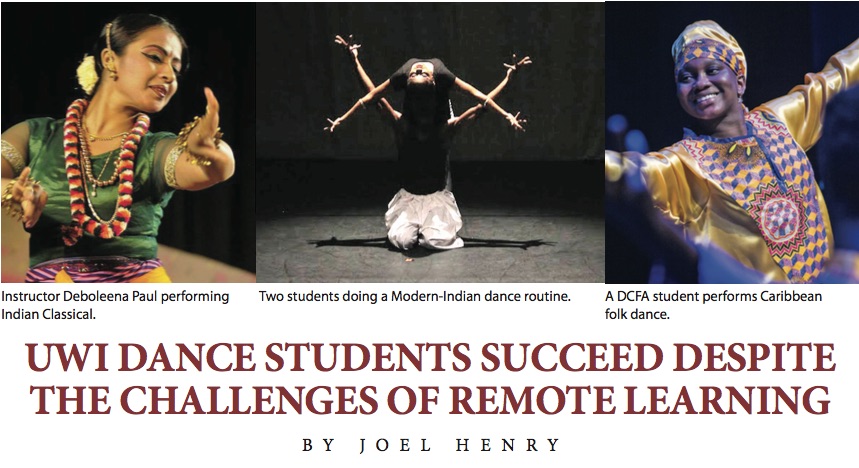
“Pursuing a formal education in my greatest passion has been a blessing,” says 34-year-old Danielle Ryan, a student working towards her bachelor’s degree in Dance at UWI St Augustine’s Department of Creative and Festival Arts (DCFA).
Danielle, now in final year, has been learning the art and science of movement in the DCFA’s Dance Unit, one of the Caribbean’s premier schools for the performing arts. The experience, she says, has been fulfilling.
Yet, in March of 2020, her studies were dramatically changed. The national response to the COVID-19 pandemic required educational institutions to switch to remote learning. Well over a year later, schools are still teaching remotely. For traditional “classroom” students it's been a challenging shift. What about those whose learning experience requires movement and performance?
“The pandemic restrictions and moving to online learning has been stressful,” says Danielle, a sentiment shared by many other students.
They no longer have access to the DCFA’s spacious dance studios with flooring that made them less susceptible to injuries. During online classes they sometimes deal with audio delay. Following movements is sometimes more difficult through a computer screen.
Apart from the practical challenges of online dance classes, there are also emotional ones.
“The energy is different from an [in-person] class,” says Jerome Tang Kwok, a 31-year-old professional dancer, teacher, and choreographer. “It’s more emotionally taxing, not sharing a physical space with like-minded individuals.”
However, far from discouraging them, the difficulties of online learning have helped to sharpen their focus. Dance is inherently a challenging discipline, both mentally and physically taxing, and studying dance at the DCFA requires students to bring their best efforts.
“Before the pandemic, studying at DCFA was rough mentally, and emotionally, but extremely fulfilling because even though it was hard, you still had the support of your lecturers to push you and give the support you need as a student,” Jerome, a dance student with a minor in theatre, explains.
At the Dance Unit, they learn Caribbean dance, ballet technique, modern dance technique, dance education, dance injuries and conditioning, Indian dance, dance composition, dance history, and movement analysis. Students can do either a three-year Bachelor of Arts in Dance or the three semester Certificate in Dance and Dance Education.
“The UWI dance programme is very well developed and has great variety,” says Deboleena Paul, instructor of Indian Dance at the DCFA. “It is not only practise based, it is also academic based. Academics is very important to dance education because it gives you the purpose behind movements, the effect of movement on the body, and even history.”
A master and scholar of Indian dance from South Asia, Paul has studied dance since her early childhood and came to the Caribbean as a diplomat and performer with the High Commission of India. Her love of the region caused her to decide to stay and apply for a job at The UWI. The expertise of DCFA’s instructors across several fields of the performing arts is another major advantage for its students.
And like her students, Paul has been required to adapt to the online teaching environment. Unable to demonstrate movements to her classes in person, she records sessions beforehand and uses multiple cameras and monitors to capture different parts of the body in action.
“As a teacher, I always want to watch my students and demonstrate the movement,” she describes.
It’s an enormous amount of work, but the students appreciate it.
“My overall experience as a DCFA student has been fulfilling,” says Danielle. “Yes there were obstacles and trials. There were definitely some tears, but the good times far outweighed the bad. I was fortunate enough to expand my knowledge, not just in dance, but in other performing arts and other aspects of the entertainment and performing art education industry.”
Danielle, who has extensive experience as a dancer and performer, plans on “joining the ranks of qualified and passionate visual and performing arts secondary school teachers”. Both the certificate and undergraduate DCFA programmes qualify graduates for jobs as dance teachers with the Ministry of Education.
Jerome’s ambition after graduation is to continue his studies at DCFA while also becoming a lecturer:
“My overall experience as a student has been one filled with self-development and growth. At DCFA you learn more than just your discipline – you learn about life, you learn to think critically and to watch the world through a new lens. You also learn about the business that comes with being a creative within the industry. I will say that you will leave DCFA a stronger person, and I will encourage any aspiring creative to further their study here.”
For more info on the Dance Unit and other programmes at the Department of Creative and Festival Arts, visit https://sta.uwi.edu/fhe/dcfa/dance.asp.